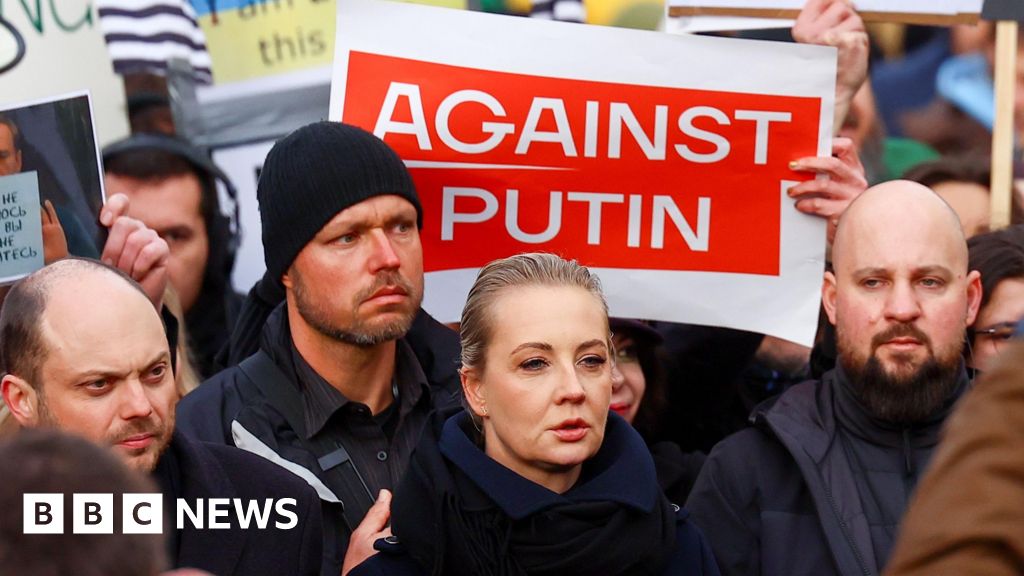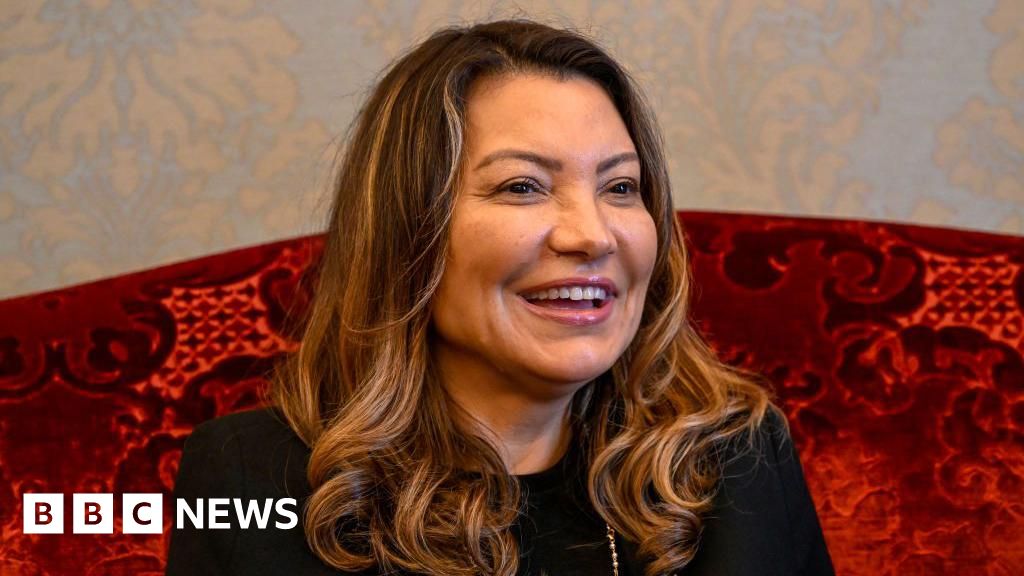ARTICLE AD BOX
WATCH: BBC correspondent Quentin Somerville takes us to the Kharkiv front line
Ukraine's second-city Kharkiv has been the constant target of Russian attacks for three weeks. The BBC's Quentin Sommerville and cameraman Darren Conway report from the front line where Ukrainian troops continue to repel the enemy advance.
We enter the house where the back door used to be. Now there is just a blanket flapping in the freezing wind. The owners, long gone, would have had a view across the rich farmland north of Kharkiv, but much of that is unrecognisable, too.
In the garage, beside an abandoned skateboard, are a dozen or so empty packing cases for some of the world's best anti-tank weapons. A dead Russian soldier lies face down in the front garden.
The house has become a frontline base, and the spent cases are an indication that the soldiers here have had the fight of their lives - a fight for Ukraine's independence.
We have gained rare access to the Ukrainian army, who after three weeks of hard fighting, are still holding firm on the outskirts of Kharkiv, preventing Russian forces from capturing Ukraine's second-largest city.
"Do you want to go further ahead?" asks Yuri, a commander with the Ukrainian army's 22 Motorized Infantry Battalion, pointing at the ruins of two Russian armoured personnel carriers, and the shattered pieces of two of their tanks. The battalion was reconstituted in 2014 after Russia invaded Crimea and backed Donbas separatists.
"They've used drones, aircraft, attack helicopters, everything," says Yuri, as Russian shells thunder overhead, striking nearby roads and apartment blocks.
Moments after Russian Grad rockets - multiple rockets launched in quick succession - fell on a residential neighbourhood
The Russians have continued to attack again and been repelled many times. In their frustration at being denied entry, they bomb the city, which was once home to 1.4 million people, day and night.
The ground is churned up and thick mud sucks on your boots. A backward glance shows the ruined shells of the line of houses we just passed through. Suburban gardens have become battlefields from Europe's past.
"The first three days were the worst. It was raining, we were covered in mud, we looked like pigs," says Olexander, 44, who is standing nearby.
By one of the destroyed armoured personnel carriers, its Z marking already faded, is a large crater, 20ft (6m) across. On the first day of the invasion, 24 February, a Russian strike killed six Ukrainian soldiers at this exact place. Many more died here since, but official figures aren't being released.
A green army boot is perched on the crater's edge, a Russian corpse beyond that. A large black crow sits nearby, untroubled by the roar of shelling and Grad rockets from Russian positions.
The men here can tell you the precise date and time they came to the front - the implication being that if you weren't here the first three days, you don't know real fighting. "Jump in the crater if there is more shelling," says Uri.
Constantine, 58, was a pilot in the Ukrainian air force until he retired and became a journalist. Now he's back at the front, walking with a limp and using a broken broom handle for support. Russian shrapnel wounded his leg, but he refuses to leave the front.
"This is the last line of defence for the city, if they get through here, they will enter Kharkiv. This road takes you from Russia to the very heart of the city," he says.
Olexander, 44, who fought in Donbas - "For the first three days, we couldn't understand what was going on"
There is a boom and whoosh, and a wire-guided missile flies just over our heads. We scramble into the crater. It strikes along the roadside, a gas pipeline bursts into flames.
While we shelter, a tall reconnaissance soldier with blue tape across his helmet tells us to stay down. Roman is 34 years old, though he jokes that he was 24 when the war started three weeks ago.
He says the Russians won't show themselves now. "They are chickens. We will respond good and proper." He stops and asks for a selfie. Later we learn that he transported the dead bodies of his fallen comrades in his own vehicle - which was just a month old - from the front to the city morgue.
As we leave, Constantine catches something in the air - thin copper wire, which stretches for miles. It was used to guide the Russian missile which just flew over our heads.
Waiting for us is Olexander, 44, from nearby Poltava region. He's been with the unit since it's founding and has fought in Donbas. "This is much worse," he says, adding: "For the first three days, we couldn't understand what was going on. We were lost and we couldn't believe it was happening. But after that we got better and we are standing our ground and will hold our positions."
I ask him why he is fighting. He gives a laugh and responds, "For a free Ukraine, for my family, and for you guys as well. For our independence and for peace."
Yuri, the commander, drives us back to the collection of Soviet-era apartment blocks, still inhabited. Russia says it came to Ukraine to demilitarise the country, but here we see what that means for civilians. A 20-storey block is still smoking from a Russian strike - it was two days ago, according to Yuri.
The official number of civilian deaths in Kharkiv stood at 234, including 14 children, on 16 March. The past few days have been punishing - as we were reminded in an instant.
A volley of Russian Grad rockets rained down on the neigbhourhood, striking just metres away. The soldiers around us had taken cover and were unharmed.
Svitlana. 72, and her husband sleep two hours a night in their bomb-damaged flat
In the same housing complex lives husband and wife Svitlana and Sasha. Svitlana is 72, and welcomes us into her home, saying they haven't spoken to anyone in weeks. "We're glad you came," she says.
Their building has already been hit, the back windows are gone, and they sleep in a central room on sofas. They manage two hours of sleep a night, the shelling is relentless. "When it stops, it is like a thaw in spring," she says.
I ask if she has a message for Vladimir Putin. "No," she replies, firmly. "No, it seems to me that this man has already lost his sanity and he does not think clearly. Because a sane human can not do something like this - bomb old people, kids, kindergartens, schools, hospitals. He wouldn't understand what I say."
But then, when I ask about the men not far from her home who are defending the city, she cries. She says, "Yes, I'm very grateful to them for protecting their homeland. Hold on guys. We will always support you. They are so brave, both boys and girls."
There are still hundreds of thousands of people living in Kharkiv, despite the shelling. If Russia and Ukraine are brothers, as the Kremlin professes, then this is fratricide.
As we leave the neighbourhood, much of it is alight. Russia's fury with this city is both seen and heard. By evening, all of Kharkiv is covered in a cloud of smoke, the relentless pounding of guns continues, but the defenders of Kharkiv still keep the enemy from the city gates.

 2 years ago
47
2 years ago
47








 English (US)
English (US)